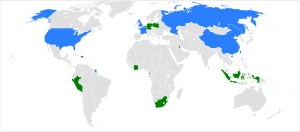2018 United Nations Security Council election
The 2018 United Nations Security Council election was held on 8 June[1] during the 72nd session of the United Nations General Assembly, held at United Nations Headquarters in New York City. The elections were for five non-permanent seats on the UN Security Council for two-year mandates commencing on 1 January 2019.
| |||
5 (of 10) non-permanent seats on the United Nations Security Council | |||
|---|---|---|---|
|
| |||
 United Nations Security Council membership after the elections | |||
| |||
In accordance with the Security Council's rotation rules, whereby the ten non-permanent UNSC seats rotate among the various regional blocs into which UN member states traditionally divide themselves for voting and representation purposes, the five available seats are allocated as follows:
- One for Africa
- One for the Asia-Pacific Group[2]
- One for Latin America and the Caribbean
- Two for the Western European and Others Group
The five members will serve on the Security Council for the 2019–20 period.
In order of votes received, Germany and Belgium were elected in the Western European and Others Group, the Dominican Republic in the Latin American and Caribbean Group, and South Africa and Indonesia in the African and Asia-Pacific Groups. In addition, the Dominican Republic was elected to the Security Council for the first time.
Candidates
African Group
Latin American and Caribbean Group
Results
African and Asia-Pacific Groups
| African and Asia-Pacific Groups election results[12] | |
|---|---|
| Member | Round 1 |
| 183 | |
| 144 | |
| 46 | |
| abstentions | 0 |
| required majority | 127 |
Latin American and Caribbean Group
| Latin American and Caribbean Group election results[12] | |
|---|---|
| Member | Round 1 |
| 184 | |
| abstentions | 6 |
| required majority | 123 |
Western European and Others Group
| Western European and Others Group election results[13] | |
|---|---|
| Member | Round 1 |
| 184 | |
| 181 | |
| abstentions | 2 |
| required majority | 126 |
See also
References
- "Monthly Forecast: June 2018" (PDF). Security Council Report. 31 May 2018. Retrieved 1 June 2018.
- "Asian group of nations at UN changes its name to Asia-Pacific group", Radio New Zealand International, 2011-08-31.
- "Zuma to campaign for SA's third turn as non-permanent member of UN Security Council". The Times. 17 September 2017. Retrieved 23 October 2017.
- "India – Maldives Relations" (PDF). Ministry of External Affairs of India. January 2012. Retrieved 20 August 2013.
- "46th ASEAN Foreign Ministers' Meeting Joint Communiqué". VietnamPlus. 1 July 2013. Retrieved 19 October 2013.
- "Dominican candidacy to Security Council seat gets regional push". Dominican Today. 30 August 2017. Retrieved 23 October 2017.
- "Surprise UN attack: Germany v. Israel". New York Post. 16 May 2013. Retrieved 20 August 2013.
- "Israel doing little to promote own bid for Security Council seat". The Jerusalem Post. 12 June 2017. Retrieved 1 March 2018.
- Martin, David (22 March 2018). "Are Germany and Israel in broken-promise runoff for a UN Security Council seat?". dw.com. Deutsche Welle. Retrieved 28 March 2018.
- "Sitz für Deutschland scheint gesichert" [Seat for Germany seems secured] (in German). ARD. 5 May 2017. Retrieved 5 May 2018.
- "BREAKING: Indonesia elected to U.N. Security Council". The Jakarta Post. 8 June 2018. Retrieved 8 June 2018.
- "General Assembly Elects Belgium, Dominican Republic, Germany, Indonesia, South Africa as Non-permanent Members of Security Council". United Nations. 8 June 2018. Retrieved 8 June 2018.
- "General Assembly Elects Côte d'Ivoire, Equatorial Guinea, Kuwait, Peru, Poland as Non-Permanent Members of Security Council for 2018-2019". United Nations. 2 June 2017. Retrieved 2 June 2017.